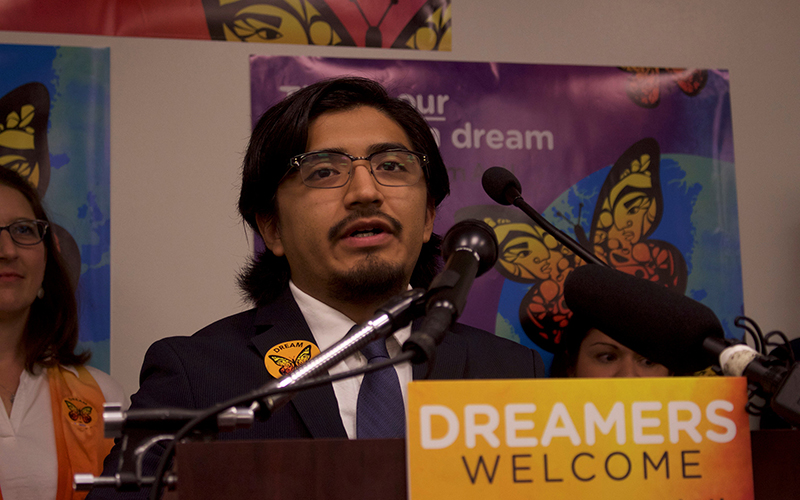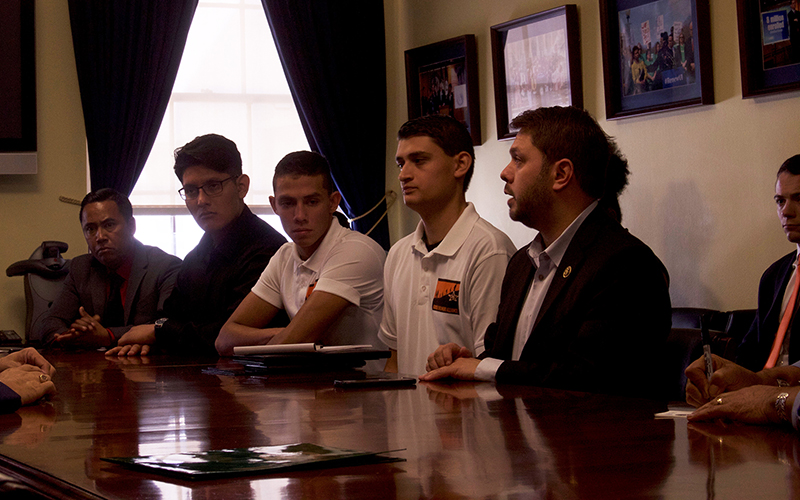
Hugo Arreola, a DACA recipient and educator from Phoenix, traveled to Washington this week to lobby with the National Education Association to get lawmakers to approve a replacement for DACA. (Photo by Andrew Nicla/Cronkite News)

Rep. Ruben Gallego, D-Phoenix, right, at a meeting of immigration advocates and progressive lawmakers. said Democrats have to push for a vote on the Dream Act to protect DACA recipients. (Photo by Andrew Nicla/Cronkite News)
WASHINGTON – Democratic lawmakers said Wednesday that there is a growing sense of urgency for a Dream Act vote – and a growing sense that they will delay the next budget bill in December if there is not a vote by then.
“We are making it apparent and clear to our own leadership that this needs to get done in December and that this needs to be a ‘clean’ Dream Act,” said Rep. Ruben Gallego, D-Phoenix. “We can’t in my mind, the Democratic Party, call ourselves the party for working people, the party for the oppressed if we can’t even stand up for 800,000 human beings.”
His comments came at a meeting between advocates, border residents and progressive lawmakers, one of at least three events Wednesday aimed at pushing Congress to act to protect the 800,000 DACA recipients who stand to lose that protection beginning in March.
One of those lobbying this week has been Hugo Arreola, a DACA recipient who works as a lab technician in the Phoenix Unified School District. Arreola, who was lobbying with a group from the National Education Association, said sees the fears of his students and he shares those fears in his own life.
“If deferred action were to end and there’s no continuation in any kind of form,” Arreloa said, “I have retirement through my job, healthcare, my driver’s license, insurance – all of that is gone.”
Arreola said his DACA coverage will not expire until August 2019, but for thousands of others the deadline looms much closer.
About 800,000 immigrants are currently covered by DACA – or Deferred Action for Childhood Arrivals – an Obama-era program that protects immigrants who were brought to this country illegally as children. Those who qualify are protected from deportation for two years and can get permits to work and go to school during that time.
But the Trump administration is ending the program on March 5, when DACA recipients could start to become eligible for deportation unless Congress acts to pass new protections.
-Cronkite News video by Fraser Allan Best
At least five bills have been introduced that would extend many of the protections of DACA, and all would include a pathway to citizenship – something that was explicitly excluded from the original program.
Most Democrats have thrown their support behind the Dream Act, which would extend and expand DACA protections. They have been calling for a vote on the bill since shortly after the Trump administration announced its intention to do away with DACA.
Advocates have insisted on a “clean” Dream Act, even though administration officials have said they will not accept legislation that does not include language for tougher immigration enforcement at the border and in the interior.
Rep. Raul Grijalva, D-Tucson, said passage of the Dream Act is too urgent to let the bill get bogged down in debates over immigration enforcement and other issues. Democrats like him have threatened to hold up a budget vote in December if they don’t get a vote on a clean Dream Act first.
“We should have that debate separately,” Grijalva said of the White House demands. “I’m almost convinced that DACA has become a convenient thing to put some of these crazy things on that on their own would not pass.”
But one DACA critic dismissed the notion that the Dream Act should be passed independent of a discussion of border security and other immigration issues. Democrats should be willing to compromise if they want a bill, said RJ Hauman, director of government relations for the Federation for American Immigration Reform.
“If the Democrats are very serious about protecting this sympathetic, if you will, population of illegal aliens, they should be willing to make some concessions that are true immigration reform principles that President Trump ran on and that are in the best interest of the American people,” he said.
But DACA recipients at Wednesday’s meeting of the Congressional Progressive Caucus urged lawmakers to stand their ground and not compromise on the Dream Act, saying their communities are at risk.
Jessica Rodriguez, a DACA recipient from Tucson, said she fears that without a replacement for DACA, there will be a return to racial profiling that she said friends and family members said they experienced under Arizona’s SB 1070. That law required that police determine the immigration status of any suspects they stopped.
“I’m not used to it and I’m never going to get used to it,” Rodriguez said. “I’m concerned for every loved one that I have … they’re still at risk because they’re targeted based on the color of their skin, they way they look and the language that they speak.”
Rodriguez said she has been pleased with discussions she has had so far with lawmakers, mostly Democrats, and is looking forward to meeting with Republicans on the issue.
– Cronkite News reporter Fraser Allan Best contributed to this report.